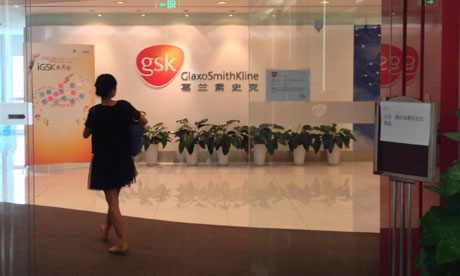by: Simon Bowers
Chinese police claim to have found evidence showing GlaxoSmithKline organised a bribery programme targeted at major hospitals at a company level in China, dismissing suggestions that abuses may have been the result of overenthusiastic or rogue sales staff, according to a state media report.
An increasing number of individuals reputedly involved in corrupt payments are said to have made confessions, according to the Xinhua news agency. “As the investigation is moving on, it is becoming clear that it is organised by GSK China rather than drug salespeople’s individual behaviour.”
GSK issued a statement denying that wrongdoing had been part of a sanctioned corporate strategy. “The issues identified would be a clear breach of our corporate values and we have zero tolerance for any behaviour of this nature.”
GSK accepted in July that some of its executives appear to have “acted outside of our processes and our controls to both defraud the company and the Chinese healthcare system”. The drug firm is accused of funnelling up to 3bn yuan (£312m) to travel agencies to facilitate bribes to doctors and officials.
The GSK chief executive, Sir Andrew Witty, told investors the company’s headquarters had “no sense” of the “shameful” and “deeply disappointing” allegations.
Tuesday’s report from the Xinhua news agency quoted Huang Hong, a general manager for GSK in China and one of the detained executives, saying the company had set goals for annual sales growth as high as 25% – 7% to 8% higher than the average growth rate for the industry.
“Huang admitted that the growth rate of sales could not reach such a high number only by the efforts of the salespeople themselves if there was no dubious corporate behaviour,” Xinhua reported.
Chinese police reportedly claim to have evidence that GSK China “went through the motions in internal auditing so as not to discover these violations”.
The Xinhua report followed an article in the official People’s Daily newspaper that quoted Guo Jianhua, head of recruitment at GSK China, saying the company had turned a blind eye to illegality.
“When the problems were exposed, the company pushed all responsibilities to individual employees,” Guo said. It was unclear to which problems Guo was referring or if he was one of the detained executives.
Official media routinely get access to detainees in China. Other detained GSK executives have been interviewed on state television.
Bribes in China’s drug industry are reportedly commonplace, fuelled in part by low salaries for doctors. A number of other multinational drugs firms are facing investigations similar to the GSK inquiry as whistle-blowers have come forward.
GSK’s continuing controversy in China comes after the drugmaker last year reached a $3bn (£1.9bn) deal with criminal prosecutors in the US, pleading guilty to a raft of offences linked to the illegal promotion of drugs. Many of the allegations related to extravagant travel provided to doctors whose business GSK was courting.
This article was written by Simon Bowers and originally published on theguardian







